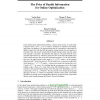Free Online Productivity Tools
i2Speak
i2Symbol
i2OCR
iTex2Img
iWeb2Print
iWeb2Shot
i2Type
iPdf2Split
iPdf2Merge
i2Bopomofo
i2Arabic
i2Style
i2Image
i2PDF
iLatex2Rtf
Sci2ools
107
click to vote
NIPS
2007
2007
The Price of Bandit Information for Online Optimization
In the online linear optimization problem, a learner must choose, in each round, a decision from a set D ⊂ Rn in order to minimize an (unknown and changing) linear cost function. We present sharp rates of convergence (with respect to additive regret) for both the full information setting (where the cost function is revealed at the end of each round) and the bandit setting (where only the scalar cost incurred is revealed). In particular, this paper is concerned with the price of bandit information, by which we mean the ratio of the best achievable regret in the bandit setting to that in the full-information setting. For the full information case, the upper bound on the regret is O∗ ( √ nT), where n is the ambient dimension and T is the time horizon. For the bandit case, we present an algorithm which achieves O∗ (n3/2 √ T) regret — all previous (nontrivial) bounds here were O(poly(n)T2/3 ) or worse. It is striking that the convergence rate for the bandit setting is only a fa...
Related Content
| Added | 30 Oct 2010 |
| Updated | 30 Oct 2010 |
| Type | Conference |
| Year | 2007 |
| Where | NIPS |
| Authors | Varsha Dani, Thomas P. Hayes, Sham Kakade |
Comments (0)

